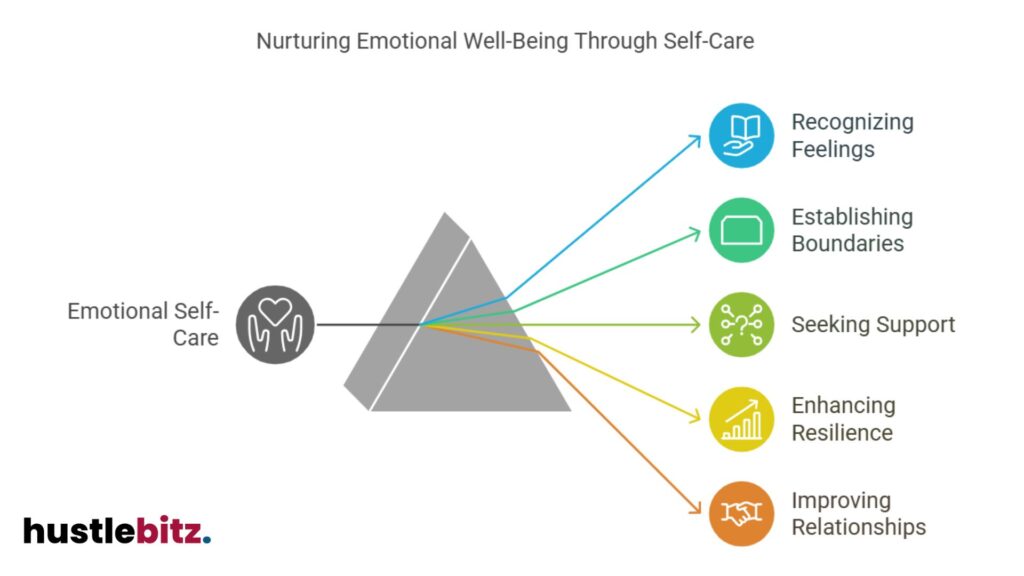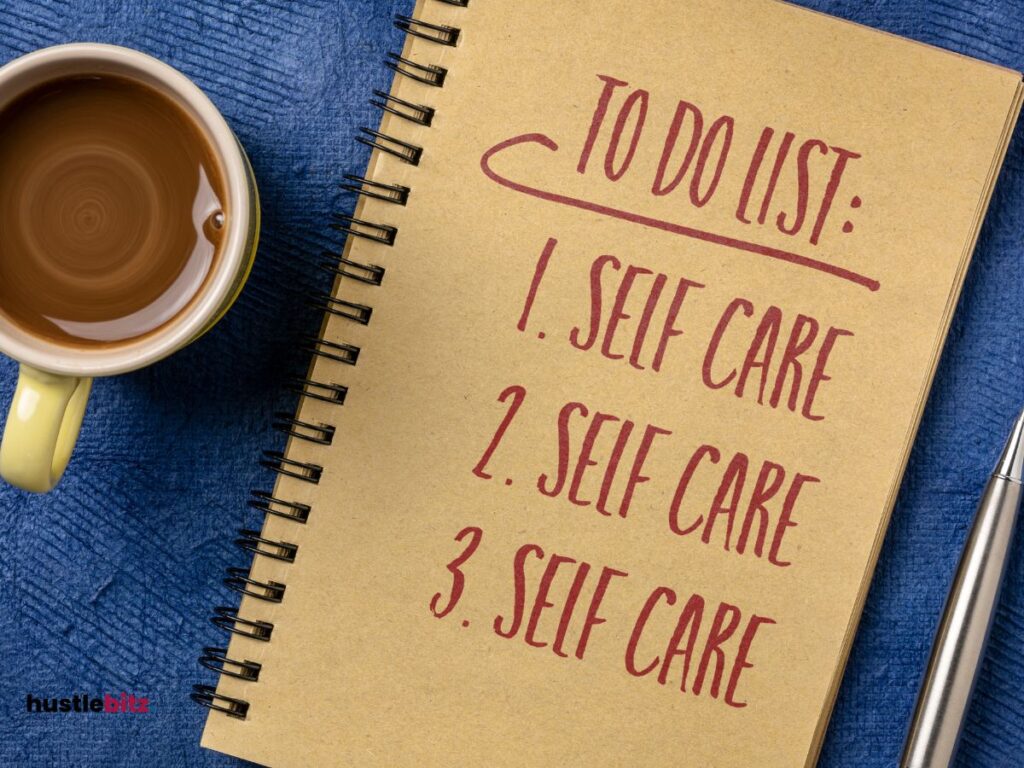Emotional self-care is an essential practice focused on nurturing one’s emotional well-being and resilience. It involves recognizing feelings, setting boundaries, and engaging in activities that enhance self-awareness and mental health. Prioritizing emotional self-care helps prevent burnout and increases overall life satisfaction. It fosters healthier relationships and equips individuals with tools for effective stress management and coping strategies. Signs that emotional self-care is needed include persistent overwhelm or social withdrawal. By understanding its significance, individuals can better navigate life’s challenges. Explore further to uncover practical strategies for enhancing your emotional health and well-being.
Key Takeaways
- Emotional self-care involves intentional practices that nurture emotional well-being and resilience for personal growth.
- Recognizing feelings and establishing boundaries enhances self-awareness and prevents burnout and emotional exhaustion.
- Strong emotional health improves relationships, reduces stress, and fosters effective coping strategies during life’s challenges.
- Practicing emotional self-care enhances resilience, promotes a positive outlook, and supports emotional regulation and well-being.
- Seeking support from trusted individuals and communities is essential for nurturing emotional health and building resilience.

Definition of Emotional Self-Care

Emotional self-care refers to the intentional practices and strategies individuals employ to nurture their emotional well-being and cultivate resilience in the face of life’s challenges. This concept emphasizes the active role individuals play in managing their emotional health and well-being, highlighting that self-care is important not only for personal growth but also for enhancing one’s ability to serve others effectively.
Engaging in emotional self-care involves recognizing and addressing one’s feelings, establishing boundaries, and seeking support when necessary. These practices help individuals better understand their emotional landscape, fostering a sense of self-awareness that is crucial for emotional health. Furthermore, by prioritizing emotional self-care, individuals can prevent burnout and emotional exhaustion, which are common when one dedicates themselves to serving others.
The importance of self-care extends beyond personal benefit; it creates a ripple effect, enabling individuals to be more present and compassionate in their interactions. When caregivers and service-oriented individuals actively engage in emotional self-care, they model healthy behaviors and create an environment that encourages emotional well-being among those they serve.
In essence, emotional self-care is a vital aspect of maintaining balance in one’s life. It equips individuals with the necessary tools to manage stress, enhance resilience, and ultimately contribute positively to their communities. Recognizing the significance of emotional self-care lays the foundation for a fulfilling and impactful journey in serving others, promoting a healthier society overall.
Importance of Emotional Well-Being
Recognizing and prioritizing emotional well-being is fundamental for fostering resilience and enhancing overall life satisfaction, allowing individuals to navigate challenges with greater ease and effectiveness. The importance of emotional well-being cannot be overstated, as it directly influences mental health and shapes our interactions with others. A strong foundation of emotional health enables individuals to respond to life’s adversities with a balanced mindset and reduces the risk of burnout and stress-related disorders.
Implementing emotional self-care practices is essential not only for personal growth but also for creating a supportive environment for those around us. By nurturing emotional wellness, we enhance our capacity to serve others, fostering a community where compassion and understanding thrive. The table below illustrates key components that contribute to emotional well-being:
| Component | Description | Benefits |
| Self-Awareness | Understanding one’s emotions and triggers | Improved emotional regulation |
| Healthy Relationships | Building connections with supportive individuals | Increased feelings of belonging |
| Stress Management | Techniques like mindfulness and relaxation | Enhanced resilience to stress |
| Positive Mindset | Fostering gratitude and optimism | Greater life satisfaction |
| Emotional Expression | Sharing feelings in healthy ways | Strengthened emotional connections |
Signs You Need Emotional Self-Care

Feeling overwhelmed, detached, or consistently fatigued are key indicators that you may need to prioritize emotional self-care. Recognizing these signs is crucial for maintaining mental health, particularly in our fast-paced world where the demands of serving others can take a toll on our emotional well-being.
One of the primary signs you need emotional self-care is a persistent sense of irritability or mood swings. When emotional health is compromised, it can become challenging to maintain patience, especially in helping professions.
Additionally, if you find yourself withdrawing from social interactions or feeling a lack of enthusiasm for activities you once enjoyed, this detachment may signal a need for rejuvenation in your self-care routine.
Another important indicator is difficulty concentrating or making decisions. Cognitive overload can emerge when emotional stress accumulates, impairing your ability to serve effectively.
Furthermore, frequent feelings of anxiety or sadness can suggest that your emotional health is one of the areas requiring attention and nurturing.
Implementing strategies for improving your emotional self-care is vital. This could include setting boundaries to protect your time, engaging in mindfulness practices, or seeking support from peers or professionals.
Prioritizing these aspects not only enhances your emotional stability but also empowers you to better serve those around you. Recognizing these signs and taking proactive steps can foster a healthier emotional landscape, essential for both personal fulfillment and the ability to care for others effectively.
Benefits of Practicing Emotional Self-Care

Practicing emotional self-care offers significant benefits that enhance overall well-being and improve one’s capacity to manage stress and interpersonal relationships effectively. By prioritizing emotional self-care, individuals can foster a deeper understanding of their feelings, leading to improved emotional well-being and resilience in the face of challenges.
The benefits of emotional self-care include:
- Enhanced Resilience: Strengthening the ability to bounce back from adversity and manage both positive and negative emotions.
- Improved Relationships: Enabling healthier interactions with others, as individuals become more attuned to their emotional needs and those of others.
- Increased Self-Awareness: Facilitating a greater understanding of one’s emotions, which is essential for personal growth and self-improvement.
- Better Stress Management: Equipping individuals with the tools to cope with stress effectively, thus reducing the need for external mental health services.
In serving others, it is essential to recognize that emotional well-being is foundational not only for personal health but also for fostering supportive and compassionate communities. Individuals who practice emotional self-care are better positioned to offer empathy and understanding to those around them, creating a ripple effect of positivity and support.
Strategies for Emotional Self-Care

Implementing effective strategies for emotional self-care is essential for maintaining mental well-being and fostering resilience in the face of life’s challenges. To support both oneself and others, understanding the various ways to practice emotional self-care is crucial. These strategies not only enhance personal strength but also promote a culture of emotional support within communities.
One effective method is to cultivate mindfulness through practices such as meditation or journaling. These activities encourage self-reflection, helping individuals identify their feelings and understand their emotional responses better.
Additionally, engaging in regular physical activity is a vital component of mental health self-care, as it releases endorphins that improve mood and reduce stress.
Establishing healthy boundaries is another essential strategy. This involves recognizing personal limits and communicating them effectively, which can prevent emotional burnout and foster healthier relationships.
Furthermore, seeking connection through meaningful interactions with friends or support groups can provide a vital network of emotional support.
Taking care of your emotional well-being also involves prioritizing self-compassion. Practicing kindness towards oneself during difficult times can lead to improved resilience and a more positive outlook.
Overcoming Emotional Challenges

Overcoming emotional challenges requires a proactive approach that involves recognizing the underlying issues and developing effective coping strategies.
By prioritizing self-care, individuals can enhance their emotional regulation and resilience, which are essential for navigating life’s ups and downs.
Understanding and managing emotional triggers is crucial in this journey, as they often lead to heightened stress and anxiety if left unchecked.
To effectively cope with stress and improve your emotional well-being, consider the following strategies:
- Identify Triggers: Take time to reflect on what situations or interactions provoke strong emotional responses.
- Practice Mindfulness: Engage in mindfulness practices such as meditation or deep breathing to ground yourself in the present moment.
- Establish Boundaries: Learn to set healthy boundaries to protect your emotional space from overwhelming influences.
- Seek Support: Don’t hesitate to reach out to friends, family, or professionals who can provide guidance and support during challenging times.
Final Thoughts
Emotional self-care is crucial for maintaining a balanced, fulfilling life. By understanding and prioritizing your emotional health, you can enhance resilience, improve relationships, and better manage stress. Incorporating practices such as mindfulness, setting boundaries, and seeking support creates a strong foundation for personal growth and well-being. Make emotional self-care a daily habit to navigate life’s challenges with confidence and clarity.




